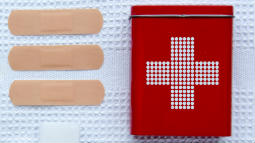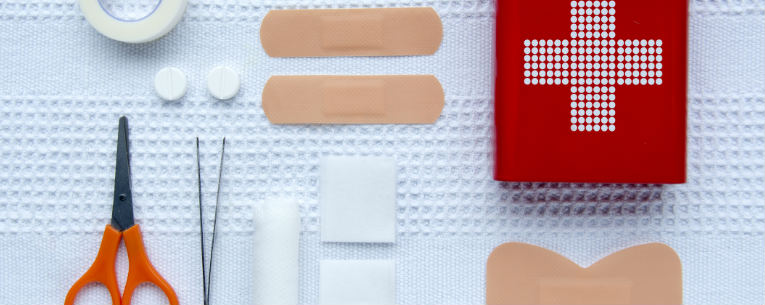Packing a first-aid kit before overseas travel or any trip might seem like overdoing it.
But once you experience an accident, injury or sickness while traveling — especially one that catches you totally unprepared — a first-aid kit seems like a perfectly logical addition to your packing list. After all, sometimes finding a Band-Aid in your own home can be a challenge.
One theme of packing a first-aid kit, whether for overseas travel or to keep in your car trunk or medicine cabinet, is that there are some items you’ll always want on hand, such as that Band-Aid. But much of the contents will be dictated by your own medical history and travel plans. It’s not practical to pack medicine and supplies anticipating every possible scenario that could unfold on your trip. There simply isn’t room. But it is a good idea to revisit and restock the first-aid kit before each trip you take. Those splints and anti-malaria pills won’t be very helpful on a shopping trip to Paris. But that moleskin might come in handy, especially in you plan on strutting around in those new Christian Louboutin pumps you plan on buying.1
The Retail First-Aid Kit vs. a D.I.Y Kit
You can find a first-aid kit in your local drug store. You can order well-stocked ones online as well, often at a value after you’ve added up the price of each item you intend to buy. We found a ton of options at different price points and apparent quality levels.
Pre-made first-aid kits are better than nothing. They’ll contain many of the medical supplies you might need if you encounter an accident or ailment abroad. You can even target kits that best fit your needs. Many of us don’t have the time to build a kit from scratch, anyways.
But the problem with these kits is they’re not tailored to your needs, including your specific itinerary, destination, and medical history. If you’re a diabetic, there likely won’t be a spot for your test strips, insulin and more. Or the amount of blister care supplies included might be pretty light for your hike through the Pyrenees. Yes, you can always supplement a pre-made first-aid kit, but the kits are often solely designed to hold what they come with. And once you’re juggling medical supplies in multiple bags and compartments, it becomes pretty unwieldy pretty fast.
Covering the Basics
Here are some of the evergreen ingredients of a well-stocked first-aid kit, for any traveler or destination:
- Your most important suitcase: the first-aid kit container: Finding the right container to store all of your medical supplies can’t be an afterthought. It needs to be waterproof, extremely durable and able to easily fit into your baggage. You might even consider a few different sizes if your trips run the gamut from weekend getaways to adventure travel spanning a month or more. Some travel pros suggest finding a first-aid kit with multiple compartments, similar to a tackle box or crafting supply kit, so you can build in some organization and quickly locate items in a pinch.2
- Gastrointestinal remedies: Simply getting out of your groove for a few days can play games with your G.I. balance. Add new cuisine, water that may not be as pure or clean as you’re accustomed to and a host of other factors, and it’s no mystery why so many folks experience conditions such as upset stomachs and indigestion, diarrhea or even worse: Montezuma's Revenge (also known as traveler’s diarrhea), which is known to afflict visitors to Mexico and Latin America. Be sure to pack anti-diarrhea meds (such as Imodium), antacids and even some oral rehydration salts if things really go south.2
- Bandages, tape, and gauze: Cuts, scrapes and even nasty wounds can put a damper on your travel plans, especially if you’re not prepared to treat them on the spot. Bring Band-Aids for smaller cuts, bandages for bigger jobs, sterile gauze to apply pressure and soak up blood, and surgical tape to make sure it all stays put.3
- Tiny tools: A pair of small scissors and tweezers will come in handy in many ways, whether you’re romping through national parks or stomping across centuries-old cobblestones. From removing splinters to cleaning wounds and fashioning bandages, these tools will help you through both minor inconveniences and major situations.
- Antiseptic wipes and antibiotics: Sterile wipes and creams are critical for cleaning out wounds and preventing infection.
- Painkillers: Whether you’re experiencing pain from superficial injuries, more serious ailments or just can’t shake off a run-of-the-mill headache, ibuprofen and acetaminophen can come in handy.
- Respiratory fixes: Travelling can trigger new or intensify existing allergies, as well as expose you to crowded places such as airports and tourist hot spots where colds spread quickly. Be sure to pack antihistamine, decongestant, cough drops and even some old-school cough syrup.4
A Few More Notes on First-Aid Kits
We mentioned up top to take your own health history into account when preparing a first-aid kit for travel. And we can’t emphasize the importance of heeding this advice enough. You (hopefully) know if you’re prone to motion sickness or altitude sickness. You know if you have an iron stomach or a sensitive one. In addition to packing all of your prescription medications, also bring over-the-counter first-aid kit supplies suited to your itinerary. Sunscreen and insect repellent are useless for some trips, but vital for others. One more thing you should be sure to pack: important medical paperwork. Depending on your destination and other factors, this can include copies of your prescriptions, proof of vaccinations, health insurance cards, a list of current medical conditions including allergies, as well as a list of emergency contacts.4
One last tip: Don't forget to pack the most important item in your first aid kit - your Allianz Travel Insurance. Our plans can include benefits for medical emergencies and evacuations. We can also provide assistance and concierge services to help you find a restaurant, a healthcare facility or even a drug store for that disappearing band aid!
So plan ahead, pack a first aid kit tailored to your needs and rest easy knowing you are prepared for the surprises globetrotting brings.
Mike Ward is a copywriter, family columnist and sometimes comic who lives in Richmond, Va. with his wife, two young kids and two mutts. He likes long road trips and rooting for losing sports teams.
Related Articles








Share this Page